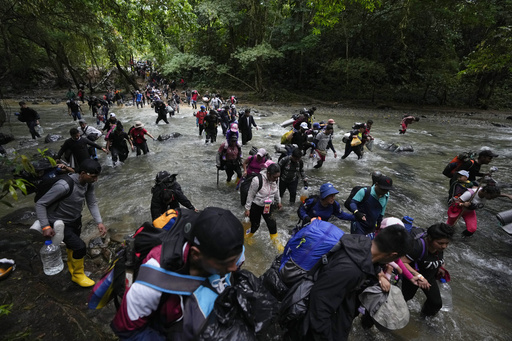A prominent human rights watchdog organization has issued a call to action for Latin American governments to enhance protection measures, provide legal status, and alleviate stringent visa requirements for the large populations of Haitians and Venezuelans struggling in South American nations. The lack of adequate work opportunities, access to healthcare, and education has pushed many of these migrants to seek asylum in the United States.
Human Rights Watch emphasized the urgent need for improved integration policies in South America to prevent vulnerable individuals from undertaking perilous journeys to reach the U.S. border, including crossing the hazardous Darien Gap between Colombia and Panama. The organization recommended the implementation of a comprehensive protection program granting legal status to all Haitian and Venezuelan migrants for a specified, renewable period, irrespective of their eligibility for formal refugee status under national laws.
Furthermore, the report urged governments to eliminate obstacles hindering the successful integration of migrants and refugees, such as regulations limiting access to work permits during the asylum process. While acknowledging commendable efforts by some Latin American nations in accommodating migrants, the report highlighted persistent challenges due to restrictive timelines, bureaucratic hurdles, and insufficient administrative capacity within asylum systems.
Data from Panamanian officials revealed a significant influx of over 700,000 migrants traversing the Darien Gap in the past year and a half, with approximately 238,000 individuals crossing so far this year. Notably, the majority of these migrants are Venezuelans escaping their country’s ongoing political and economic turmoil. Additionally, around 11,000 Haitians have undertaken the arduous journey through the jungle towards the U.S. border, seeking refuge from dire conditions exacerbated by gang control in the capital and widespread food insecurity.
The living conditions of Haitians in South American countries are marked by challenges in obtaining residency permits and formal employment, making it increasingly untenable for them to support their families and prompting the decision to migrate to the United States. Venezuelans, meanwhile, face difficulties integrating into economies that have slowed down in the wake of the pandemic.
Research conducted by the United Nations Refugee Agency revealed that a significant proportion of Venezuelans attempting to seek asylum in the United States had previously resided in countries like Peru, Chile, Colombia, and Ecuador. Despite these efforts to establish new lives in South America, the UNHCR report indicated that a considerable percentage of Venezuelans eventually turned towards the U.S. border as a result of ongoing struggles in their host countries.
The complex challenges faced by Haitian and Venezuelan migrants underscore the pressing need for comprehensive policy changes and collaborative efforts across Latin America to ensure the protection and well-being of displaced populations in the region.


